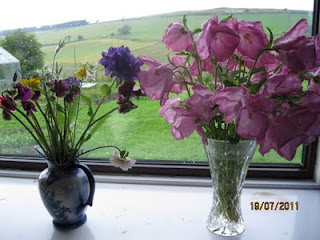
It has never occurred to me until this moment that flowers might not stir the heart of another quite like they do mine. In a similar way: poetry. Flowers and poetry, I suppose, are perceived subjectively. I could not say they are themselves subjective in nature. I’d have to ask, whose nature? Therefore they must have an authentic center independent of my projection, a hallmark of the Land like that of a tree, a brook or mountain. So do they influence outside the limits of our interpretation? Have they that power in their beauty?
Paul went out in the rain this morning and came back with the loveliest bunch of flowers. Their variety and freshness enchanted me. Their fragrance, full of grace. They sparkled beneath the layer of moisture that rested on their petals. Holding them in my hand was like the memory of a great poem. Life is a stream/on which we strew/petal by petal the flower of our heart. (The start of Petals, a poem by Amy Lowell)
Cottarton Flower Farm is at a loss in how to define itself. Paul would like to see a conventional outcome for his labor of love and the months of muscle demanded in the preparation of new beds, planting and so forth. I’m more the romantic sort and see them in a wholly different light.
The problem with selling our flowers is in part lack of visibility but in a greater part their competitive cousins from South Africa and Holland who dominate the market. They’re smartened up with packaging and food filled sachet packets, psychologically placed at the front of the store near the cashier, just in case you might grab a bunch on you way through the check out. They’re pretty too. (Goodness, how could one think otherwise of a flower?) But they all look the same. The same, freesias, daisies, carnations, roses and lilies are raised in protected environments, maintained by generous doses of fertilizer, watered by irrigation systems, in short, fostered for one reason: commerce.
If a Cottarton flower comes to full bloom, it has had to partner with the wind, the rain, our bashful sun whose rays are rarely seen, and bugs and snails and other beasties. These are hard working flowers with a radiance that shouts individuality and character. Yes, Cottarton Flowers have character. Ever beyond into infinite ways/We alone stay/While years hurry on/The flower fared forth, though its fragrance still stays.
It wasn’t so long ago that the types of flowers in our garden were the pride of every manor house in the county. Few women had the means to enjoy such luxury of freshly cut flowers on a windowsill in summer. The Canterbury bells, Michelmas Daisies, Sweet Peas, and the local wildflowers were the show of every well appointed household. But like so much else in our world today, the flowers that can be marketed to the masses are the ones raised and produced in greenhouses and poly-tunnels in far away places.

When I lived in Houston, Texas and a friend of mine asked, “If you could write your life in exchange for the one you have now, what would be different?” I had to think about it for awhile because Zach and I were not flush with money and resources, but we were happy and we laughed a lot and we told stories and we listened to music and we ate very well – even if the phone got disconnected (which if often did) our table was full of wonderful, homemade delights. I eventually answered, “Flowers.” If I could change anything, I’d have the money to put fresh flowers on my table every day of the year.
So I have this idea that there are elderly people out there who can’t get to the store for flowers or who can’t actually afford the luxury of them and I think of taking Cottarton Flowers to them, to brighten their windowsill. I think of the homeless who by a stroke of luck end up in a council flat starting a new life. I would like flowers on their table.

Would it influence them in ways of compassion and kindness? Would they treasure these flowers? For those of us who can buy flowers like a stick of gum, who give little thought to them, who perhaps don’t even change their water or split their stems, have they become just “another household item” to us? How do we bring back the divine, the poetry in the flower that sits on our kitchen table? I think it will return when there awakens a deep appreciation for the gift from the Earth, this gift that grows wild in concert with the four elements and produces the most heavenly flowers. Angels and garden sprites abound, dancing in and out of Cottarton Cottage Garden, as high as the treetops and as deep as the roots where the magic takes hold.
No comments:
Post a Comment